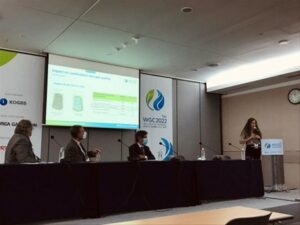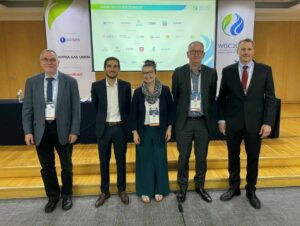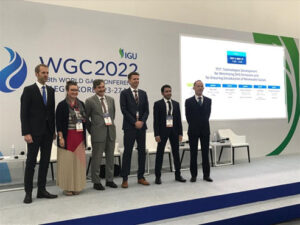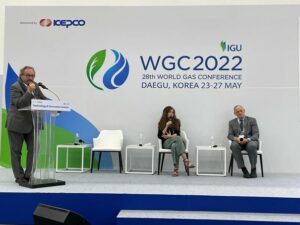RICE participation in the WGC 2022: Promoting the contribution of R&D to decarbonization
The 28th World Gas Conference (WGC 2022) organized every three years by the International Gas Union (IGU) took place in Daegu, South Korea from May 23 to 27. With more than 500 speakers in 70 sessions, over 350 exhibitors and 12,000 participants from 90 countries, the World Gas Conference is the most important event in the gas industry.
In this context, RICE's expertise was highlighted by our speakers Alice Vatin, Lorella Palluotto and Jérôme Valdivia, allowing the know-how of French R&D and the daily work of our teams to shine.At the heart of this year's discussions were two major concerns: security of supply and market upheavals related to the war in Ukraine. Another crucial issue is the need to accelerate the decarbonization of the gas industry. During four days, numerous debates and conferences presented the different initiatives led by the companies. Many innovations were also presented in the exhibition area for the development of low-carbon gases and hydrogen. An opportunity to share the dynamism of the gas industry in favor of the energy transition and a more sustainable future.
THURSDAY, MAY 26 - INDUSTRY INSIGHTS
On Thursday, May 26, as part of the " Industry Insights"Alice Vatin, Lorella Palluotto and Jérôme Valdivia participated in two sessions on the role of natural and renewable gas in decarbonizing industry and the role of emerging gas technologies in reducing carbon emissions.
Natural Gas - An essential vector towards a sustainable and low carbon world
The session focused on the fundamental role that natural gas must play in the decarbonization of industry and the tertiary sector, mentioning in particular:
- Commercialization strategies and energy demand growth
- The production of electricity
- Industrial and commercial applications with very high energy efficiency
- Other uses (as raw material)
- Comparison with other energy solutions
- The role of renewable gases
- Gas quality management and impacts
- A state-of-the-art study on the impact of hydrogen/natural gas mixtures on industrial applications.
Are industries capable of handling hydrogen and natural gas mixtures? This is one of the questions that RICE is trying to answer by studying the potential of hydrogen to decarbonize industrial processes.
Lorella Palluotto presented the results of RICE's work, in particular the impacts of hydrogen on combustion processes and on the quality of manufactured products. It also provided a final overview of the acceptability of hydrogen for industrial equipment and processes.

From left to right: Philippe Buchet (ENGIE), Markus Lesemann (GTI), Nuno Afonso Moreira (Dourogas) Lorella Palluotto (RICE)
Decarbonization: the role of gas technologies in moving towards a low-carbon society
The objective of this session was to address emerging gas technologies that will enable a systemic solution supporting a low carbon energy system including heat, power and mobility. This includes, but is not limited to, technologies such as hydrogen (blue and green), biogas, electricity-to-gas conversion, LNG. Participants shared how these technologies should be coupled with low-carbon power systems to achieve a resilient and economically viable energy system. Finally, the panel highlighted key challenges to the adoption of these technologies by sharing regulatory, policy, and financial developments in their geographic regions, including suggested solutions to overcome these barriers.
- Methane Pyrolysis [turquoise H2]: An emerging low carbon H2 production process
Alice Vatin : " RICE is conducting R&D work on methane pyrolysis, a new way of producing low-carbon hydrogen from natural gas. Compared to the steam reforming of methane, the main hydrogen production process, there are no CO2. Indeed, the cracking of the methane molecule produces clean hydrogen and solid carbon as a co-product. Both of these co-products are recovered to make the process economically and environmentally viable."
- R&D activities on Jupiter 1000: an industrial Power to Gas demonstrator with electrolysis, methanation and gas injection into the gas transmission network.
Jerome Valdivia: "Jupiter 1000's Research & Development activities focus on four main issues: assessing asset performance; monitoring plant reliability and durability; analyzing the impact of hydrogen on downstream equipment, pipelines and industrial users; and contributing to the state of the art on the Power to gas.
The RICE teams are mobilizing their expertise to meet these challenges and thus contribute to decarbonization with Power-to-gas."

From left to right: Gerhard Schmitz (TuTech Innovation), Jérôme Valdivia (RICE), Alice Vatin (RICE), Robert Judd (GERG) and Michael Rutkowski (GTI)
FRIDAY 27 MAY - TECHNOLOGY & INNOVATION
On Friday 27, during the "Technology & Innovation" sessions in the Exhibition area, Alice Vatin and Lorella Palluotto also spoke on the promising topics of methanation in France and carbon capture, utilization and storage (CCUS) solutions for industry.
Development of technologies to minimize GHG emissions and ensure the introduction of renewable gases
This session aimed to explore the tools and innovations that will enable the development of increasingly green gases, while ensuring the safe and reliable introduction of renewable gases and the minimization of emissions.
Alice Vatin : "Methanation is a common step in power-to-methane and pyrogasification projects and is a key element to enable future injection into the gas grid. It is therefore a crucial stage for gas operators. RICE participates in the steering committee of several promising pilot projects for the production of new methanes and will carry out, from 2022, in-depth gas analysis campaigns on some of the demonstrators. The aim of these is to support the development of these production technologies, to reduce the cost of injecting new methanes and to manage the potential impacts of these new renewable and low-carbon gases on the entire gas chain."

From left to right: Dr. Tobias van Almsick (OGE), Alice Vatin (RICE), Peter Harcus (Jemena), Geir Klungtveit (Equinor), Mohammed Alfawzan (Saudi Aramco) and Jonas Berg (Emerson)
How can natural gas solutions contribute to the implementation of the transition to a carbon-free economy?
In a changing world, the level of requirement of companies as a vector of transition to greener energies and the agendas of organizations make it necessary to reflect on the various sectors of gas uses (excluding residential). The objective of the session was to present examples and case studies on the role of natural gas in the commercial, industrial and power generation sectors as a solution that can help implement the transition to zero carbon.
RICE discussed carbon capture, utilization and storage (CCUS) technologies that can help industry in its transition to zero carbon and presented a comparative analysis of post-combustionCO2 capture technologies and their potential application in industry.
Lorella Palluotto: "Carbon Capture, Utilization and Storage (CCUS) is one of the existing solutions to decarbonize industry, in particular those sectors characterized byCO2 emissions from the process and not only from the use of fossil fuels. RICE is investigating promisingCO2 capture technologies for industrial applications. The main families of post-combustion and oxy-combustion carbon capture technologies were presented on May 27 at the WGC. Their suitability for practical industrial cases was discussed."

From left to right: Philippe Buchet (ENGIE), Lorella Palluotto (RICE) and Alex Grzybowski (Pacific Resolutions)
After the success of this event, an appointment has been made for the next WGC2025 edition, which will be held in Beijing, China. There is no doubt that the RICE teams will be there again to fly the colors of French gas research.